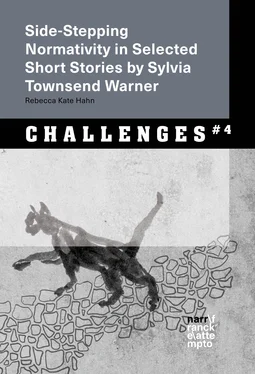It is not until Laura encounters Satan and eventually becomes a witch that she feels that she is getting close to achieving her personal freedom. Throughout the novel Satan remains an enigmatic character that not even Laura can pin down. In reply to her question, “Tell me about yourself”, Satan counters, “Tell me first what you think” ( LW 238, emphasis in the original). Inevitably, this question prompts Laura to start talking. She speaks out for herself and womankind when she says:
When I think of witches, I seem to see all over England, all over Europe, women living and growing old, as common as blackberries, and as unregarded. […] Well, there they were, there they are, child-rearing, house-keeping, hanging washed dishcloths on currant bushes; and for diversion each other’s silly conversation, and listening to men talking together in the way men talk and women listen. Quite different to the way women talk, and men listen, if they listen at all. […] Nothing for them except for subjection and plaiting their hair. (239–40)
Laura continues talking in this manner and Satan patiently listens to what she has to say. At a later point, he even encourages her to continue talking to structure her thoughts (cf. 244). She explains that women become witches to “escape all that – to have a life of one’s own, not an existence doled out […] by others” (243). Laura clearly recognises that society treats women unjustly, but does not make plans to change the situation for women by, for example, becoming politically active.
Laura eventually comes to realise that she does not fit into any of the groups of society open to her – neither in London nor in Great Mop. She therefore “[finds] herself moving even further into the indifferent, non-social company of shrubs and ditches” (Hotz-Davies and Gropper 1). Knoll finds this aspect of the novel problematic and expresses his dissatisfaction at the way Laura rejects society and gradually isolates herself from it at the end of the novel by stating, “It is not a perfect solution, in that Laura is effectively cut off from all others” (361). Knoll overlooks the fact that Laura is not cut off by society, but cuts herself off from the society towards which she has become indifferent. He does not recognise that Laura is content with her chosen lot and does not wish to join the society of any particular group. When Laura finds herself alone after Satan’s departure, she realises that the sun has gone down and that she has missed the last bus back home. Instead of feeling intimidated by the situation, Laura experiences a new sense of freedom:
First Satan, then the sun and the bus – adieu, mes gens ! With affectionate unconcern she seemed to be waving them farewell, pleased to be left to herself, left to enter into this new independence acknowledged by their departure. ( LW 250)
At the end of the novel Laura starts walking – and literally disappears – into the woods. This scene hints at the fact that death is possibly the only way to end the quandary of having to “keep one foot on the ground” (cf. Schabert 154).
In view of the narrative style of the novel and the behaviour of the main protagonist, Laura, Ina Schabert describes Lolly Willowes as a “foot-off-the-ground novel”. The term “foot-off-the-ground novel” was originally coined by the female protagonist, Pompey, of Stevie Smith’s Novel On Yellow Paper Or Work it Out For Yourself (1936). Referring to the novel she is writing, Pompey states,
This is a foot-off-the-ground novel that came by left hand. And the thoughts come and go and sometimes they do not quite come and I do not pursue them to embarrass them with formality to pursue them into a harsh captivity. (38)
Pompey’s novel does not follow a chronological order; it describes events, actions and people that randomly spring to the narrator’s mind. Pompey further states that the only reason why she adheres to traditional rules of writing in the structure of her novel is to make it more accessible to the reader.7 With regard to foot-off-the-ground novels, Schabert states:
Der Boden, von dem die foot-off-the-ground novels abheben, ist die allgemeine Kultur, die akzeptierte gesellschaftliche, politische, moralische und literarische Sinnstiftungspraxis. Die Autorinnen halten Abstand zu dem, was das Ihre nicht ist. Sie erzählen mit anderen als den gewohnten Prioritäten, Ordnungs- und Wertvorstellungen. Ein solches Erzählen ist in letzter Konsequenz paradox, da jede Literatur, um verständlich zu bleiben, sich der etablierten Diskurse bedienen muss. Ganz ohne diesen Boden geht es nicht; strenggenommen kann deshalb auch nur ein Fuß gehoben werden und ‘woanders’ sein. (153, emphasis in the original)
Schabert claims that it is impossible for authors to write literary works without employing established literary “tools” and referring to certain aspects of human society. For this reason, Pompey is forced to use, for example, punctuation and orthographic rules. The above quote further implies that literary works are, by necessity, connected with human systems of thought, language and knowledge since humans are unable to comprehend anything that exists outside the domains of these systems. In Lolly Willowes this point of view is reflected by the actions of the protagonist. The protagonist, Laura, demonstrates how impossible it is to live outside the boundaries of the human world, that is, outside what Lacan terms the symbolic order (cf. also Hotz-Davies and Gropper 1).8 Laura forms a life for herself in which society and all those “other useful props of civilisation” gradually become insignificant to her. In line with Schabert’s description of foot-off-the-ground novels, Lolly Willowes does not feature any “[h]arte Gegenüberstellung, Antagonismen, Polemik gegenüber dem allgemein Akzeptierten, lautes Verlachen” (153). Laura ultimately displays a form of indifference that enables her to cope with her surroundings through detachment. Schabert points out: “In der Regel entwickelt sich kein feindseliges Verhältnis zu [der gesellschaftlichen Welt], sondern eher Gleichgültigkeit, verbunden mit Kompromissbereitschaft” (159).
Readers will recognise that this particular mode likewise prevails in Warner’s short stories. As the following chapters will illustrate, this is one of the reasons why Warner’s fiction readily opens itself up to the form of reparative reading suggested by Sedgwick – that is, to a reader who is willing to explore the intricacies of a text, a reader who will accept that the stories sometimes shift to eccentric positions, that they open up gaps but do not close them, and that they do not always offer neat and tidy solutions. In this, they undoubtedly contain many queer moments. In the following analyses, it will become apparent that Warner has long disengaged herself from oppositional, dualistic ways of writing.
In his introduction to The Element of Lavishness: Letters of Sylvia Townsend Warner and William Maxwell (1938–1978) (2001), Michael Steinman draws attention to the fact that Warner makes no distinction between same-sex partnerships and heterosexual partnerships. “Trusting that the Maxwells would read her words and understand her experience with great sensitivity”, Steinman writes, “she [Warner] wrote of her marriage as equivalent to theirs […]” (xix). Maxwell and Warner became close friends and exchanged numerous letters on various subjects, including their respective relationships. In her letters to Maxwell, Warner makes a casual remark about her life with Valentine Ackland:
When Valentine & I had our grand house in Norfolk, with a servant, we used to count the hours till her half-days & evenings out when we would rush into the kitchen and read her novels and magazines: not quite up to the level of Mrs Henry Wood (she was too young for that) but such a grateful change from Dostoevski. ( EoL 146)
Читать дальше












